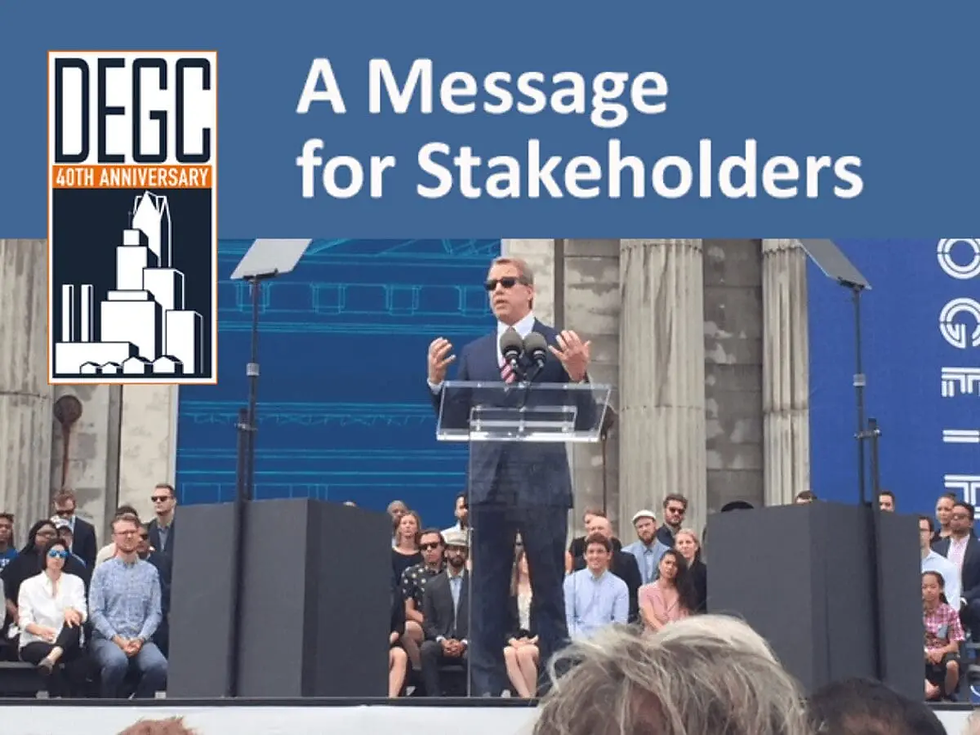DEGC Welcomes Ford to Corktown
- DEGC

- Jun 19, 2018
- 4 min read
From Kevin Johnson, President and CEO Ford’s acquisition of Michigan Central Station is an affirmation of Detroit’s mobility leadership, and a catalytic opportunity for new employment, neighborhood development and a transformational breakthrough in information technology. The move heralds a new era in transportation, where freedom of movement is achieved through cloud-based innovation. DEGC has been at the forefront of Detroit’s mobility movement. It’s just one of the many sectors Detroit leads in alongside food innovation, global logistics and advanced manufacturing. Our attraction and retention efforts focus on these businesses because they offer jobs, opportunities, talent and real estate. Attracting big business is only part of the equation, of course. So we also play a leading role in helping to create vibrant neighborhoods that provide residents with walkable retail corridors that offer needed goods and services, as well as local jobs. That is why Ford’s announcement this past Tuesday was so important. It sits at the nexus of DEGC’s economic vision for Detroit: A vibrant city where new investment drives opportunity for our people, and our people become the magnet to draw new investment. There is no better economic attraction than the value of Detroiters. With Ford and General Motors located Detroit, as well as several key automotive suppliers, one could say Detroit is reclaiming its historic moniker as the Motor City. After all, Detroit has been synonymous with the automotive industry since its beginnings. The first auto assembly plant, the birth of the modern auto show and the vision for future mobility were all born here. Despite past setbacks, Detroit continues to lead the world as the hub of the automotive industry. Detroit is the epicenter of research and development in the automotive and mobility industries, housing 76 percent of U.S. automotive R&D investment. While it’s important to recognize our heritage as builders and makers and embrace our historic auto DNA, today’s world of mobility is much more than gasoline engines and Sunday drives. Mobility is an industry that is just as much defined by wheels, as it is computers, batteries and autonomous technology systems. For those reasons – and not just because of the contributions of Henry Ford, William Durant and Walter Chrysler – Detroit is the natural place for Ford’s investment to happen. Of course, attracting businesses of any type starts with holistic solutions enabled by a pro-business environment. That includes a favorable corporate tax structure, and access to numerous flexible incentives at the city, state and federal level. But what’s most important is access to a workforce that will develop tomorrow’s breakthrough technology. Detroit has a tremendous pipeline of STEM talent thanks to the deep university footprint in the region. In addition, Detroit is building a bench of workforce training and support programs to produce a steady stream of skilled talent. This pipeline of multiple skill sets, plus the influx of global corporations, has given Detroit the largest and fastest growing engineering workforce in the nation. This is exactly the type of talent that will not only advance mobility, but will have a tremendous impact on the continued revitalization of our city. The type of employees Ford will house at its Corktown facility – young people with technical portfolios – have a distinctive imprint on a city. According to many studies, these individuals are more likely to live in the same city they work and utilize the amenities of a city to a greater extent. You’ll find these people on bike paths and dog parks, going to local concerts and festivals, and weaving themselves into a city’s fabric. They favor local businesses – general retail, restaurants and bars, and “big-box” alternatives. This group also acts as a magnet to other national and global companies that are drawn to the workforce pipeline and often move operations here to leverage the talent. We’re already seeing the explosion of interest from young people in Detroit. Tech employment in Detroit is up 40 percent from 2011, compared to an 18 percent growth in the non-tech sector. The city has seen a 9.2 percent increase in its 20 to 29-year-old population since 2010, ranking it sixth in millennial population growth in large U.S. cities. As Ford reveals its long-range plans for Corktown and beyond, DEGC will continue working to support Detroit’s mobility sector, as well as our neighborhood retail strategy, so that Detroit’s businesses and its people live harmoniously. It’s our job to leverage Ford’s investment so that residents citywide feel its benefit and have access to resulting opportunities. DEGC is already being recognized for our leadership. Ford Motor Company Chairman Bill Ford, during his remarks at the Tuesday announcement, acknowledged DEGC for its contributions to the train station purchase. Detroit Mayor Mike Duggan praised Kenyetta Hairston-Bridges and Sarah Pavelko – core members of the DEGC real estate team – for their work in helping make the sale possible. DEGC will play a critical role as the Corktown investment takes shape, from creating incentive packages to working with Ford and its suppliers on acquiring additional parcels of land. For DEGC, Ford’s announcement creates a world of opportunity. You can count on DEGC to utilize all of our tools to multiply the benefit of this investment to create a positive impact for everyone who calls Detroit home.




